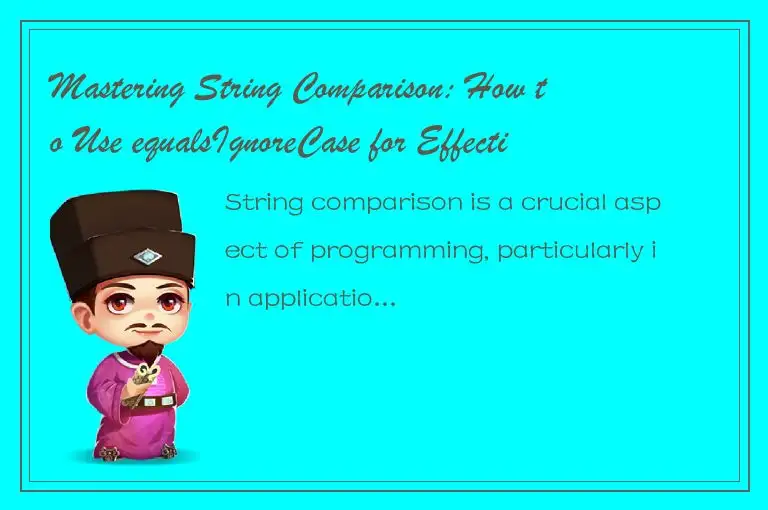String comparison is a crucial aspect of programming, particularly in applications that deal with user input and strings. In this context, the equals() method is commonly used to compare strings. However, this method is case-sensitive, meaning it distinguishes between uppercase and lowercase letters. This can present a challenge, particularly when dealing with user input, which may not always adhere to a specific capitalization. Fortunately, the equalsIgnoreCase() method provides a solution to this problem. In this article, we will explore the equalsIgnoreCase() method and demonstrate how to use it for effective text comparisons.

What is equalsIgnoreCase()?
The equalsIgnoreCase() method is a built-in method in the String class that compares two strings without regard to their capitalization. This means that it considers lowercase and uppercase letters to be the same. The method returns a Boolean value: true if the two strings are equal, ignoring case, and false if they are not equal.
Syntax
The syntax for the equalsIgnoreCase() method is as follows:
public boolean equalsIgnoreCase(String s)
Here, the parameter “s” is the string that is being compared to the current string object. The method compares the current string object to the given string “s” and returns true if they are equal, ignoring case, and false if they are not equal.
Example Usage
Consider the following example:
String str1 = "Hello World";
String str2 = "hello world";
if (str1.equalsIgnoreCase(str2)) {
System.out.println("The two strings are equal");
} else {
System.out.println("The two strings are not equal");
}
In this example, we have two strings, “str1” and “str2,” that contain the same characters but have different capitalizations. We have used the equalsIgnoreCase() method to compare the two strings. As expected, the method returns true, and the output is “The two strings are equal.”
Advantages of Using equalsIgnoreCase()
1. User-friendly: When dealing with user input, it is almost impossible to ensure that the input will always be in the same case. By using the equalsIgnoreCase() method, we can allow for user error and still ensure that the system will recognize the input as valid.
2. Simplicity: The equalsIgnoreCase() method is simple to use and does not require complex code or algorithms.
3. Efficient: The equalsIgnoreCase() method is built into the String class, meaning that it is already optimized for efficiency. It is generally faster than manually converting two strings to the same case and then comparing them using the equals() method.
Limitations of equalsIgnoreCase()
1. Limited to String Comparisons: The equalsIgnoreCase() method can only be used for comparing strings. If we need to compare other types of data, we will need to use different methods or algorithms.
2. May Impact Performance: While the equalsIgnoreCase() method is generally efficient, it may impact performance in cases where it is used frequently or with large strings. In such cases, it may be more efficient to convert the strings to the same case manually and then use the equals() method.
Best Practices for Using equalsIgnoreCase()
1. Use equalsIgnoreCase() for User Input: When dealing with user input, it is best to use the equalsIgnoreCase() method to ensure that the system can recognize valid input regardless of the capitalization.
2. Combine with equals() Method: If the system requires string comparisons that are both case-sensitive and case-insensitive, we recommend combining the equalsIgnoreCase() and equals() methods. This allows the system to recognize both kinds of string comparisons.
3. Consider Performance: As with any method, it is essential to consider the performance impact of using the equalsIgnoreCase() method. If it is being used repeatedly or with large strings, it may be more efficient to manually convert the strings to the same case and use the equals() method.
Conclusion
The equalsIgnoreCase() method is an essential tool for effective string comparison in programming. It provides a simple and efficient way to compare strings without regard to their capitalization, making it particularly useful in applications that deal with user input. However, it is important to consider the performance impact of using this method and use it in combination with other methods as needed. By mastering the equalsIgnoreCase() method, programmers can achieve effective and user-friendly string comparisons in their applications.




 QQ客服专员
QQ客服专员 电话客服专员
电话客服专员